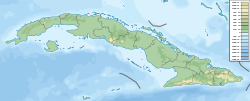This article has multiple issues. Please help improve it or discuss these issues on the talk page. (Learn how and when to remove these messages)
|
| Beth Shalom Temple | |
|---|---|
 The synagogue exterior, 2008 The synagogue exterior, 2008 | |
| Religion | |
| Affiliation | Conservative Judaism |
| Rite | Nusach Ashkenaz |
| Ecclesiastical or organizational status | Synagogue |
| Status | Active |
| Location | |
| Location | Calle I Esq. 13, Vedado, Havana 10400 |
| Country | Cuba |
 | |
| Geographic coordinates | 23°08′30″N 82°23′22″W / 23.141634°N 82.389425°W / 23.141634; -82.389425 |
| Architecture | |
| Type | Synagogue architecture |
| Style | Modernist |
| Date established | 1904 (as a congregation) |
| Groundbreaking | 1951 |
| Completed | 1953 |
| Specifications | |
| Capacity | 300 seats |
| Materials | Cement-block |
Beth Shalom Temple (Hebrew: בית הכנסת בית שלום, romanized: Beit haKnesset Beit Shalom; Spanish: Gran Sinagoga Bet Shalom), commonly referred to as El Patronato, is a Conservative Jewish congregation and synagogue, located in the Vedado neighbourhood of downtown Havana, Cuba.
Completed in 1953, Temple Beth Shalom is the main synagogue serving Havana's Jewish community of 1,500 people. The congregation was founded in 1904 and it has been an epicenter of Jewish life in Cuba. The synagogue welcomes thousands of visitors each year for both Shabbat and tours of Jewish Cuba.
History
| This section needs additional citations for verification. Please help improve this article by adding citations to reliable sources in this section. Unsourced material may be challenged and removed. Find sources: "Beth Shalom Temple" Havana – news · newspapers · books · scholar · JSTOR (July 2024) (Learn how and when to remove this message) |
Jews arrived in Cuba shortly after the expulsion of Jews from Spain in 1492. Subsequent waves of Portuguese Jews from Brazil and Dutch Jews arrived in Cuba from the 16th to 19th centuries. Ashkenazi Jews from Europe started arriving in Cuba, usually via the United States, following the Spanish-American War. The congregation was established in 1904.
The synagogue originally opened its doors in 1953 as the grandest Jewish house of worship in Havana. Its soaring Romanesque fused European and Moorish-Spanish elements into a unique hybrid Modernist style.
By the 1980s however, shifting political tides had greatly thinned the Jewish population. In 1981, the state purchased a large portion of the building to establish the Bertolt Brecht Cultural Center. Extensive restorations in the 1990s revived the sanctuary's structural integrity and interior opulence with support from benefactors like the American Jewish Joint Distribution Committee and under the guidance of Shmuel Szteinhendler.
Temple Beth Shalom's history and enduring makes it a site of pilgrimage for Jewish visitors from across the globe.
As of 2017, the congregation did not have a regular rabbi.
With the relaxation of religious restrictions, Temple Beth Shalom led a revival of public Jewish expression. The temple continues asserting its position as the flagship institution sustaining the Cuban Jewish community. The building also houses a Jewish library.
Visitors to the synagogue have included Steven Spielberg, Sean Penn, Fidel Castro and Raul Castro.
See also
References
- ^ "El Patronato (Beth Shalom)". Synagogues360. 2024. Retrieved November 7, 2024.
- ^ Tapper, Josh (January 27, 2015). "For Cuban Jews, improved US ties may not ease hardships". The Times of Israel. Retrieved November 7, 2024.
- Ziri, Danielle; Gellis, Mike; Senft, Steven; Toussier, Isaac (April 18, 2017). "So close and yet so far: The Jews of Cuba". The Jerusalem Post. Retrieved November 7, 2024.
- "For Cuban Jews, endless deprivation". Globe: FIU.edu. Archived from the original on July 4, 2008.
- "The Cuba Connection". The Star Tribune – via Jewish Cuba.
- "Havana Synagogue Dark for Decades is Once Again Aglow in the Light of Shabbat Candles". United Jewish Communities. Archived from the original on October 9, 2007.
- Jewish Community of Cuba: The Golden Years, 1906-1958. Nashville, Tennessee: Westview Publishing Company. February 2006. ISBN 0-9776207-0-0.
External links
![]() Media related to Beth Shalom Temple (Havana, Cuba) at Wikimedia Commons
Media related to Beth Shalom Temple (Havana, Cuba) at Wikimedia Commons
- "Havana Synagogue Tour". Havana Jewish Tour. Retrieved November 7, 2024.
| History | |||||
|---|---|---|---|---|---|
| Groups |
| ||||
| Synagogues | |||||
| City of Havana, capital of Cuba | ||
|---|---|---|
This article about a synagogue or other Jewish place of worship in Cuba is a stub. You can help Misplaced Pages by expanding it. |
- 1904 establishments in Cuba
- 20th-century architecture in Cuba
- 20th-century synagogues in the Caribbean
- Ashkenazi synagogues
- Ashkenazi Jewish culture in North America
- Conservative synagogues in North America
- Jewish organizations established in 1904
- Modernist synagogues
- Synagogues completed in 1953
- Synagogues in Havana
- North American synagogue stubs
- Cuban building and structure stubs